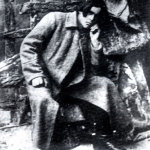The father of modern linguistics is still opening up new kinds of questions and topics for inquiry.

“For the first time I think that the Holy Grail is at least in view in some core areas, maybe even within reach.” Image: Wikimedia Commons
By: Amy Brand (posted 12th Aug 2019)
I have been fascinated with how the mind structures information for as long as I can remember. As a kid, my all-time favorite activity in middle school was diagramming sentences with their parts of speech. Perhaps it’s not surprising, then, that I ended up at MIT earning my doctorate on formal models of language and cognition. It was there, in the mid-1980s, that I had the tremendous good fortune of taking several classes on syntax with Noam Chomsky.
Although I ultimately opted off the professorial career track, I’ve been at MIT for most of my career and have stayed true in many ways to that original focus on how language conveys information. Running an academic publishing house is, after all, also about the path from language to information, text to knowledge. It has also given me the opportunity to serve as Chomsky’s editor and publisher. Chomsky and the core values he embodies of deep inquiry, consciousness, and integrity continue to loom large for me and so many others here at MIT, and are well reflected in the interview that follows.
Amy Brand: You have tended to separate your work on language from your political persona and writings. But is there a tension between arguing for the uniqueness of Homo sapiens when it comes to language, on the one hand, and decrying the human role in climate change and environmental degradation, on the other? That is, might our distance from other species be tied up in how we’ve engaged (or failed to engage) with the natural environment?
Noam Chomsky: The technical work itself is in principle quite separate from personal engagements in other areas. There are no logical connections, though there are some more subtle and historical ones that I’ve occasionally discussed (as have others) and that might be of some significance.
Homo sapiens is radically different from other species in numerous ways, too obvious to review. Possession of language is one crucial element, with many consequences. With some justice, it has often in the past been considered to be the core defining feature of modern humans, the source of human creativity, cultural enrichment, and complex social structure.
As for the “tension” you refer to, I don’t quite see it. It is of course conceivable that our distance from other species is related to our criminal race to destroy the environment, but I don’t think that conclusion is sustained by the historical record. For almost all of human history, humans have lived pretty much in harmony with the natural environment, and indigenous groups still do, when they can (they are, in fact, in the forefront of efforts to preserve the environment, worldwide). Human actions have had environmental effects; thus large mammals tended to disappear as human activity extended. But it wasn’t until the agricultural revolution and more dramatically the industrial revolution that the impact became of major significance. And the largest and most destructive effects are in very recent years, and mounting all too fast. The sources of the destruction — which is verging on catastrophe — appear to be institutional, not somehow rooted in our nature.
“The sources of the destruction — which is verging on catastrophe — appear to be institutional, not somehow rooted in our nature.”
Continue reading “On Language and Humanity: In Conversation With Noam Chomsky”



